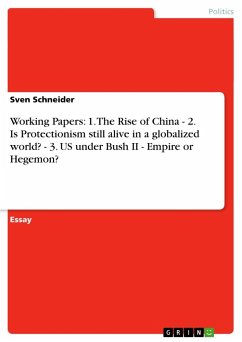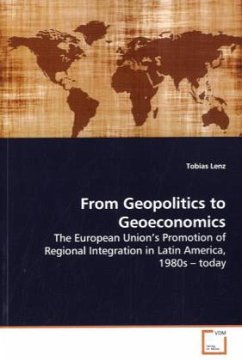
Antidumping as a Form of Protectionism
Versandkostenfrei!
Versandfertig in 6-10 Tagen
32,99 €
inkl. MwSt.

PAYBACK Punkte
16 °P sammeln!
The purpose of this study is to test statisticallythe theory advanced by opponents ofantidumping measures, that antidumping actions are inreality pure protectionism.Specifically, it relates the internal economiccondition such as the internationalcompetitive position of countries to the number ofantidumping initiations and theantidumping measures taken by them. The independentvariables are generally definedas the internal economic condition and theinternational competitive position. That is,the internal economic condition is measured by GrossNational Income (GNI) per capitaand the unemployment ...
The purpose of this study is to test statistically
the theory advanced by opponents of
antidumping measures, that antidumping actions are in
reality pure protectionism.
Specifically, it relates the internal economic
condition such as the international
competitive position of countries to the number of
antidumping initiations and the
antidumping measures taken by them. The independent
variables are generally defined
as the internal economic condition and the
international competitive position. That is,
the internal economic condition is measured by Gross
National Income (GNI) per capita
and the unemployment rate. The international
competitive position is expressed in the
trade balance and import penetration. The dependent
variables are generally defined as
protectionist pressure and protectionism. The former
is quantified in antidumping
initiations and the latter in antidumping measures.
The research is conducted separately
for the two dependent variables for all 147 WTO
member states. The results show that
GNI and import penetration have a statistically
significant relationship with antidumping
actions.
the theory advanced by opponents of
antidumping measures, that antidumping actions are in
reality pure protectionism.
Specifically, it relates the internal economic
condition such as the international
competitive position of countries to the number of
antidumping initiations and the
antidumping measures taken by them. The independent
variables are generally defined
as the internal economic condition and the
international competitive position. That is,
the internal economic condition is measured by Gross
National Income (GNI) per capita
and the unemployment rate. The international
competitive position is expressed in the
trade balance and import penetration. The dependent
variables are generally defined as
protectionist pressure and protectionism. The former
is quantified in antidumping
initiations and the latter in antidumping measures.
The research is conducted separately
for the two dependent variables for all 147 WTO
member states. The results show that
GNI and import penetration have a statistically
significant relationship with antidumping
actions.












